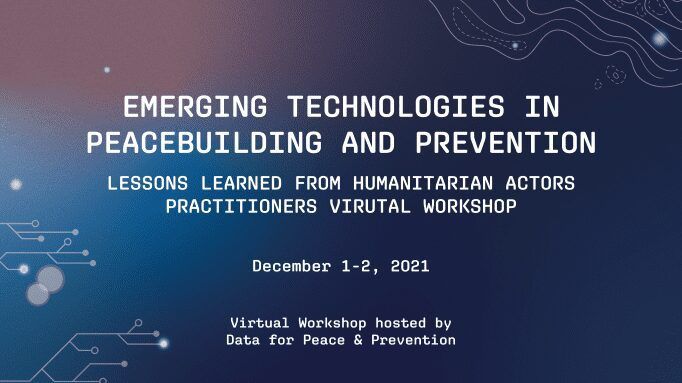
Emerging Technologies in Peacebuilding and Prevention—Lessons Learned from Humanitarian Actors Practitioners Virtual Workshop
This virtual workshop will provide an opportunity for attendees to discuss the current and future applications of emerging technologies in peacebuilding and learn from humanitarian actors and their experiences. The workshop will create a space for sharing both successes and failures, while envisioning together how to increase the use and impact of data and data-driven approaches in peacebuilding and conflict prevention. Mark your calendars to to join colleagues and practitioners across the globe as they share their work and lessons learned from emerging technologies in humanitarian and peacebuilding fields. Registration will be open for all interested participants in late October.
As conflict and violence become increasingly complex, peacebuilding and prevention practitioners are searching for novel approaches to tackle the growing challenge. Emerging technologies and data science methods have been recognized as potential tools to tackle some of these challenges across the humanitarian-development-peace nexus. Humanitarian actors are often upfront in innovating and more advanced in collecting lessons learned of what works and what does not and when and where emerging technologies should be used or should be avoided as the trap of techno solutionism. Advanced analytics and machine learning, drones and 3D printing, blockchain, and virtual reality are some of the trends that are already transforming humanitarian assistance around the world. Some of the lessons learned about the impacts of these technologies in conflict-affected context are already known, such as:
- Data collection and sharing is important for upholding the security of civilians
- Prompt data analysis can enhance situational awareness of the main security threats
- Advanced analytics can enhance the early warning systems, ideally leading to early action
- Dual-use technologies have a risk of misuse and reverse engineering, which is why strong guardrails are needed to protect both data and citizens
Humanitarian and peacebuilding work is carried out in similar contexts—in fragile countries and with vulnerable populations. Similar settings bring similar challenges and responsibilities, which makes sharing lessons even more relevant. With the “HDP triple nexus,” these actors already recognized linkages between their efforts and emphasized the need to work together to meet peoples’ needs more effectively, mitigate risks and vulnerabilities, and sustain peace. We see exchanging lessons in the field of emerging technologies as a natural part and the next step of these efforts. Hence, this event offers a platform for this exchange to happen.
Organizers: The conference is organized by the NYU Center on International Cooperation, in partnership with the Ministry of Foreign Affairs of the Netherlands, and with support from the United Nations (UN) Office for the Coordination of Humanitarian Affairs (OCHA)’s Centre for Humanitarian Data.
Audience: Peacebuilders and prevention practitioners working with data and emerging technologies, or interested in engaging in this field in the future.
This international workshop is the fourth in a series, building on previous convenings in New York (2019), the Hague (2020), and the virtual Early Warning/Early Action workshop in May 2021. For any additional questions contact us at: branka@aiforpeace.org.

Stay Connected
Subscribe to our newsletter and receive regular updates on our latest events, analysis, and resources.
"*" indicates required fields